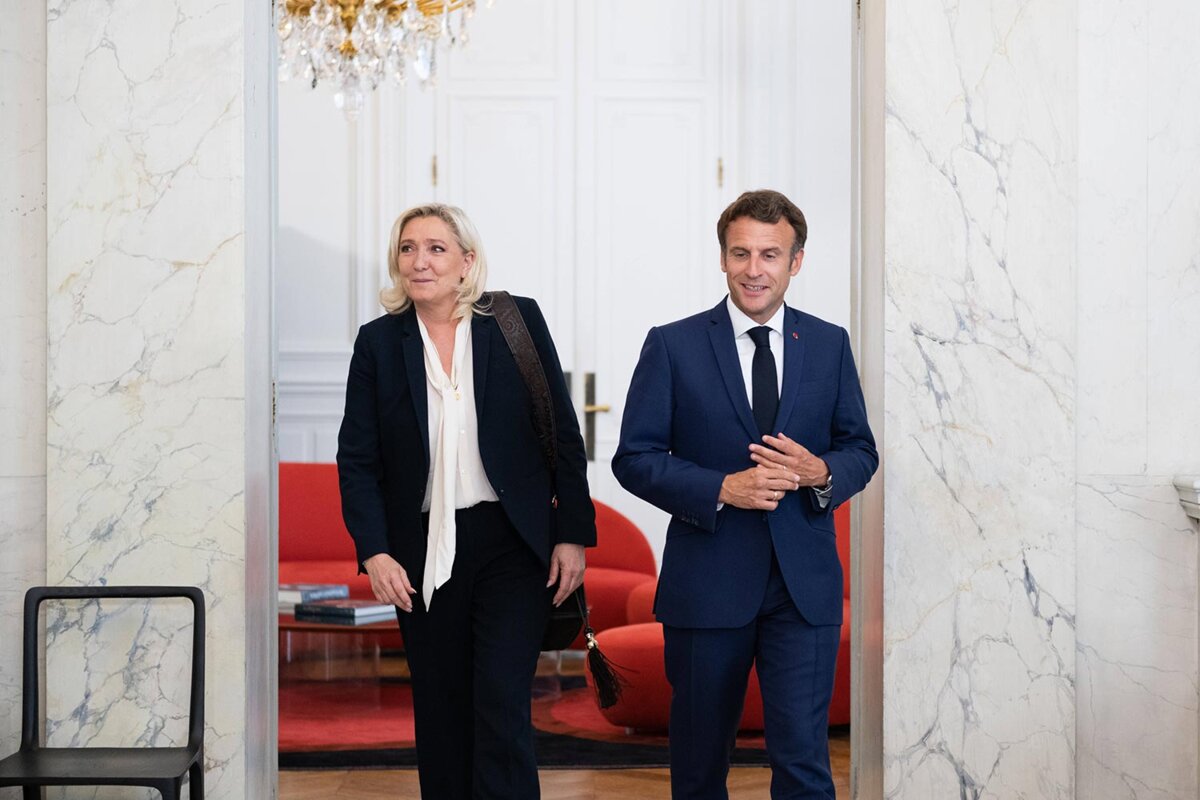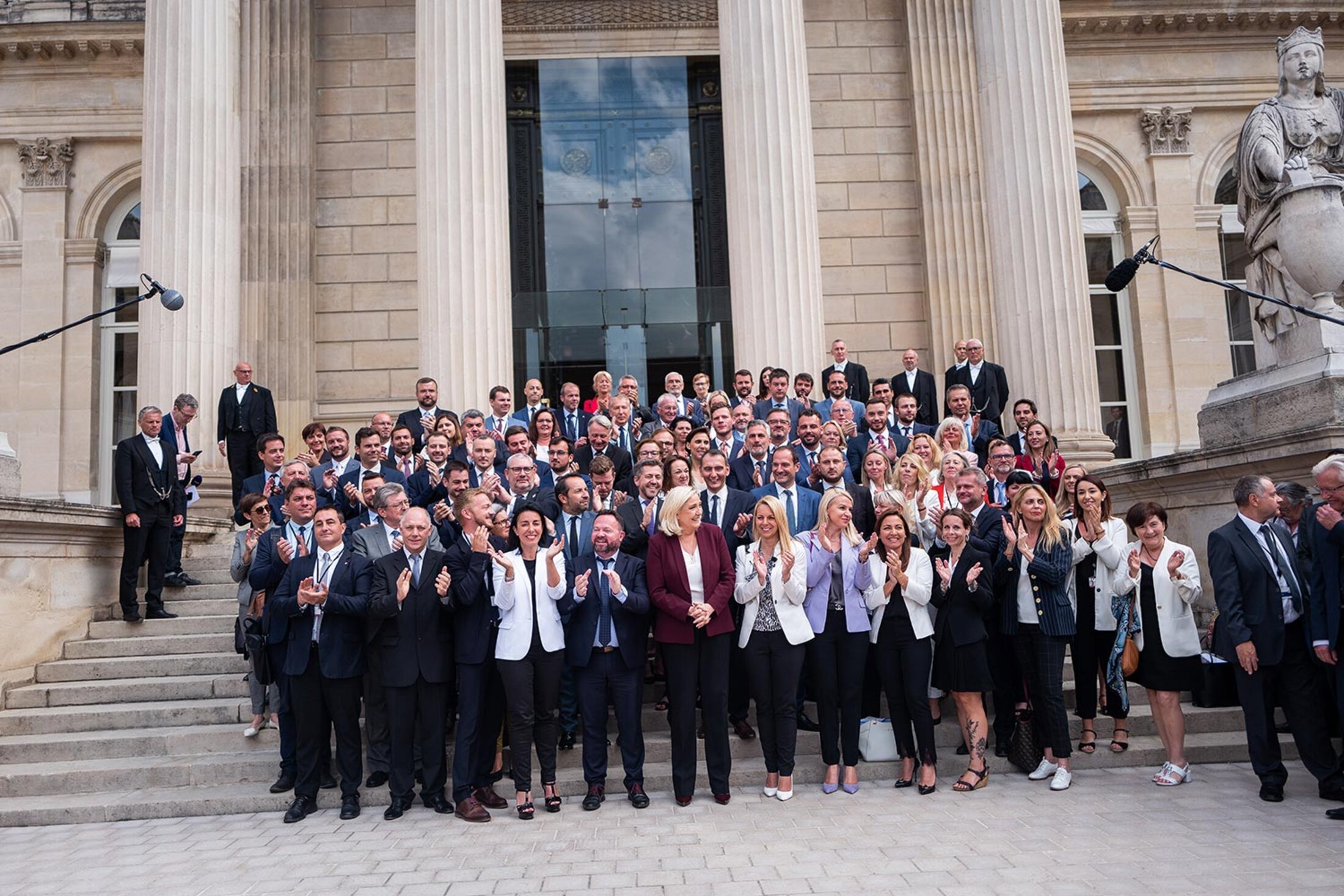Yaël Braun-Pivet and Gérard Larcher were keen to speak with one voice when they launched an initiative that they describe as “extremely powerful”. This is the march in Paris this Sunday “for the Republic and against anti-Semitism”, a “civic march” based on “values that bring the French people together”. The president of the National Assembly, who is from the ruling Renaissance party, and her Senate counterpart, who is from the rightwing Les Républicains, declared on TFI television news on Wednesday evening: “France needs an awakening of Republican values.”
This initiative is now embarrassing the Right and dividing the Left, mainly because of the announcement that far-right politicians Marine Le Pen and Éric Zemmour will take part in the march. Le Pen called on “all members of… and voters for” her party Rassemblement National (RN) to “come and join in this march”. Meanwhile Zemmour and supporters from his Reconquête party also gave notice that they will be attending the gathering. As for Yaël Braun-Pivet and Gérard Larcher, they insisted: “We won't be marching alongside Rassemblement National.”
Some other leading Macron supporters have made similar comments, such as the official government spokesperson Olivier Véran. After Wednesday's weekly meeting of ministers Véran said the RN had “no place” at the gathering, given that the party's co-founder -back then it was the Front National - Jean-Marie Le Pen has been convicted for dismissing the Holocaust as a “detail”, and given his successors' refusal – starting with the current titular head of the far-right party Jordan Bardella – to “cut ties with the anti-Semitic roots” of the movement, which was created in 1972 with former wartime collaborators.

Enlargement : Illustration 1

Emmanuel Macron has joined the fray too. Speaking recently to the Grand Orient de France masonic organization, the president criticised those who “claim to support our Jewish compatriots by confusing the rejection of Muslims with support for Jews, and by themselves refusing to condemn clearly their past position and all their past words”. These words stand in sharp contrast to the language and political strategy that the president has used for some time now in relation to the RN, contributing as it has to that party's normalisation.
This approach is clearly not new; Nicolas Sarkozy, for example, went down that route when he was head of state. But it has accelerated in unprecedented fashion since the 2022 Parliamentary elections and the arrival of 89 far-right MPs (since reduced to 88 after a by-election) at the National Assembly. Swiftly forgetting the leftwing voters that switched to him in the second round of the presidential election in 2022 when he was facing Marine Le Pen, the newly re-elected Emmanuel Macron again started equating the united Left – which according to him had “chosen sectarianism rather than universalism” - with the far right's policies of “exclusion”.
The institutional 'normalisation' of the far-right RN
This dangerous rhetoric, uttered with disdain for principles and political history, has been picked up by a chorus of Macron supporters, who have continually blurred the boundaries and made supportive comments. Prime minister Élisabeth Borne, for example, stated that “Marine Le Pen and her [Parliamentary] group respect the procedures”, labour minister Olivier Dussopt said that Le Pen was “much more Republican than others” during debates over the recent pension reforms, while Yaël Braun-Pivet herself said that RN MP Sébastien Chenu “was not a good but a very good vice-president” of the Assembly.
The far-right MPs quickly established themselves in the Assembly obtaining not one but two of the six vice-president posts at the institution thanks in particular to votes from the presidential majority. And because of its friendly relations with right-wing MPs, the RN Parliamentary group even tried at the start of this Parliamentary session to win the presidency of a working group on anti-Semitism, before several MPs brought this bid to an abrupt end, remembering that the far-right party had after all been co-founded by a former member of the Waffen SS.
Since taking office the Assembly's president Yaël Braun-Pivet has consciously reserved the same treatment for far-rights MPs as for other members. “One must respect the fact that the French people have chosen to make Rassemblement National the main opposition group at the Assembly,” she told Mediapart in November 2022. “I think that it's counter-productive to fight the RN at an institutional level.” The result of this logic was not long in coming: Marine Le Pen's group now has an institutional legitimacy that no Macron supporter publicly disputes.
The fight against the far right no longer revolves around moral arguments.
For more than a year, therefore, attacks from the Right – both those in power and those in opposition – have focused on the broad leftwing alliance the Nouvelle Union Populaire Écologique et Sociale (NUPES). Though the main party in NUPES, the radical-left La France Insoumise (LFI), has been the principal target, other MPs on the Left have not been spared either. During the 2022 Parliamentary elections former minister Amélie de Montchalin, who was facing a difficult battle against socialist Jérôme Guedj, even went so far as to call on voters to “form a very clear barrier” against the leftwing coalition, which “promised the French people … submission to anti-Semitic ideas”.
In recent years the Left has often been accused of indulging anti-Semitism, whose definition has been broadened to include anti-Zionism. This line of attack came first from Emmanuel Macron himself in February 2018, and then the MP Sylvain Maillard, who is today head of the ruling Renaissance party group of MPs at the Assembly, who piloted the adoption of a resolution on the issue in December 2019. Meanwhile several members of the presidential majority have started to question the underlying nature of the far right and their supposed ideological evolution by quibbling over terminology.

Enlargement : Illustration 2

During a televised debate in June 2022 François Bayrou, the president of MoDem, the centrist party who form part of the presidential majority, thus declared in relation to the the views of RN MP Philippe Ballard: “I'm not sure if one calls that far right.” To which the former boss of the UMP (now Les Républicains) Jean-François Copé retorted ironically: “That's the best one yet, you're making concessions to the far right.” During the same period we also saw justice minister Éric Dupond-Moretti envisaging the possibility of working with the RN on several bills, and Senate president Gérard Larcher explaining that Éric Zemmour was not racist.
The sorcerer's apprentices of triangulation
Meanwhile any rare criticism of Marine Le Pen's party has led to the person responsible being put in their place. line. Just a few months ago prime minister Élisabeth Borne was hauled into line by Emmanuel Macron during a weekly cabinet meeting of ministers after she described the RN as the “successors to Pétain”. This was a reference to Marshal Philippe Pétain who led the wartime Vichy government in France which collaborated with the Nazis. “The fight against the far right no longer revolves around moral arguments.,” the head of state said at the time. Macron said the far right instead had to be stripped of any credibility by attacking the content of its policies and its inconsistencies rather than by using “words from the 1990s that no longer work”.
What had the prime minister of the day said to merit such a rebuke? She had merely made a factual observation. “I've never heard Marine Le Pen attack her party's historic stances. I think that a change of name [editor's note, from Front National] doesn't change the ideas, the roots,” Élisabeth Borne had noted. Indeed, Marine Le Pen has never formally condemned her party's roots, and was simply happy for its stance to morph towards one of fighting against Islamic fundamentalism. In fact, when she became head of the party in 2011 she even stated that she wanted to take responsibility for the party's “entire legacy”.
The prime minister's firmer approach was in fact deployed by Emmanuel Macron himself between the two rounds of voting in the 2022 presidential election, when in a bid to court leftwing voters he still found it necessary to quote slogans from La Ligue Communiste Révolutionnaire (LCR) and make discreet overtures to supporters of the radical left LFI. “Collectivity, I've heard less talk about [Marine Le Pen] being of the far right,” he declared in March 2022. He then added: “People have looked away, they say 'they're nicer now', have normalised it...” But this tougher attitude was short-lived.
France isn't responsible for the Vél d'Hiv [round up of Jews in Paris] because France was in London …
In the face of the RN's electoral success at the Parliamentary elections, Emmanuel Macron and a section of his supporters have again started to give legitimacy to the words and leading figures of the far right. During his first term of office from 2017 to 2022 the president had already allowed his ministers to fuel constant talk about “Islamo-Leftism”, to say they thought Marine Le Pen was “too soft”, and to recycle her language or pounce on the smallest row started online by the far right when it involved Muslims. He himself ended up reacting in the same way over identity issues as had his predecessor Nicolas Sarkozy.
Forced to play the role of sorcerer's apprentices in political triangulation, the various groupings on the Right have fallen into their own trap. How can Emmanuel Macron, Yaël Braun-Pivet or Gérard Larcher, all three of whom are supposed to represent our institutions, claim to make a strong case against Rassemblement National when they have cosied up to them for so long? How can they justify not marching alongside that party's MPs to defend the Republic's values when they have constantly praised those MPs' “Republican” behaviour?
And while some Macron supporters, such as the head of the Renaissance party Stéphane Séjourné, have indeed kept on repeating that there is no question of becoming “complicit in the normalisation of a party founded by anti-Semites”, the damage has been done. To understand this, one only has to listen as RN MPs calmly explain that “Marine Le Pen is without reproach on the issue”, despite the fact that in 2017 the very same Marine Le Pen still held the view that “France is not responsible” for the wartime round-up of Jews in July 1942 at the Vél d'Hiv winter stadium in Paris. After all, Gérald Darmanin said the same – see here and here – and he is now France's interior minister.
In this context – one could say political fog - those on the Left are clearly not blameless. Despite the initial progress made by NUPES, it has been unable to impose itself against the rise of the far right, has failed to stem its internal quarrels, has not been particularly audible on many issues, and has been unable to expose the – very blatant – tactics employed by the Macron camp. The public debate has now been turned on its head, as the notion that the “anti-racists have become the racists” - first propounded by the far right and the extreme right – has today spread to the rest of the political spectrum. Having deliberately muddied the political waters, the government and its allies ended up creating a maelstrom which has swallowed up both familiar reference points and principles.
-------------------------------------------------------------------------
- The original French version of this article can be found here.
English version by Michael Streeter


